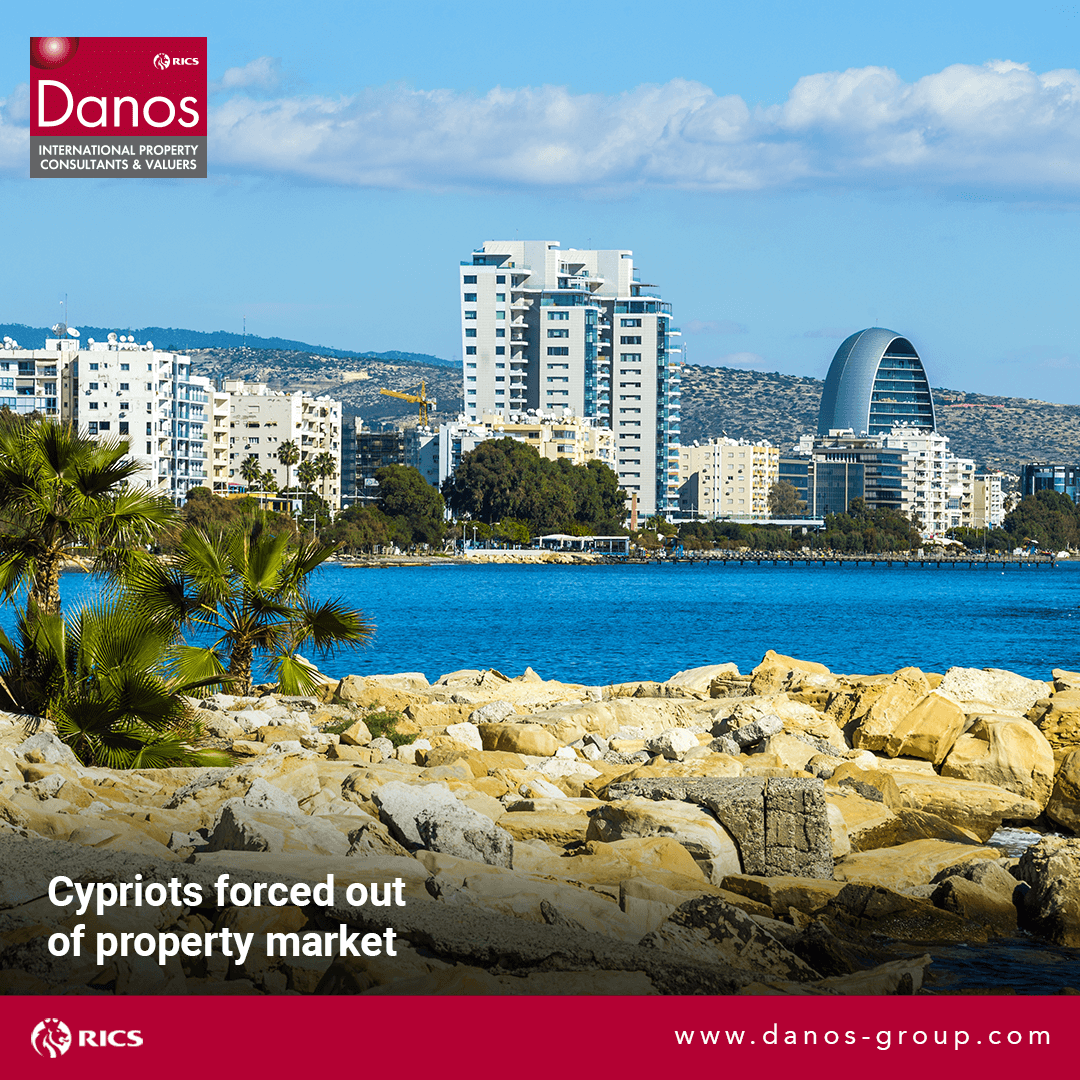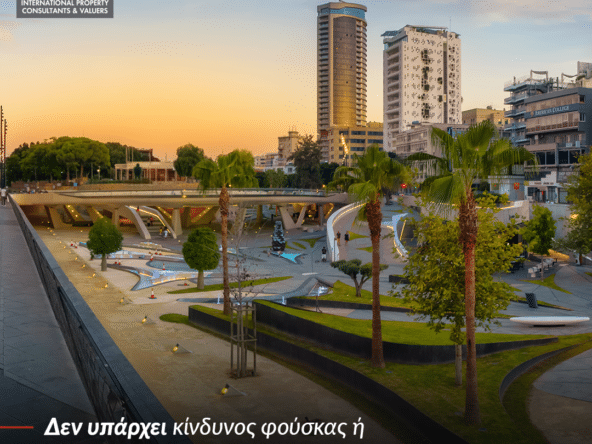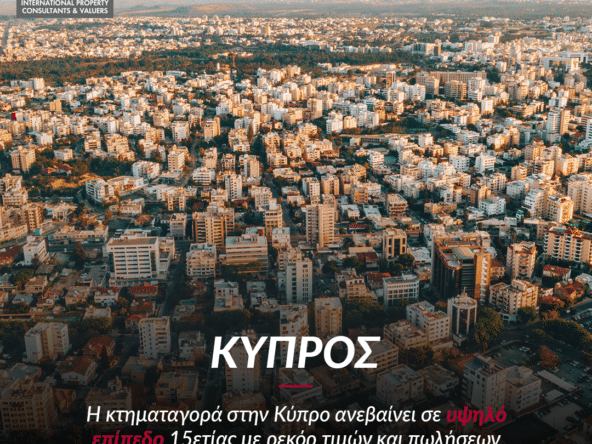Cypriots are being squeezed out of the property market as they can’t afford climbing rents, while construction costs and interest rates make homes unaffordable, say real estate agents.
Talking to the Financial Mirror, Panos Danos FRICS, CEO of DANOS International Property Consultants & Valuers, said that despite real estate showing a significant recovery despite the uncertainty triggered by the energy crisis, the market is tough.
Danos noted that a 20% plus increase in construction costs and a hike in mortgage rates had prompted Cypriot households to think twice about borrowing money to buy their dream home as demand for mortgages dipped.
“The Cypriot economy did not remain completely unscathed, with inflation rising here as it did elsewhere, particularly affecting the more vulnerable groups,” commented Danos.
The veteran real estate stakeholder argued that many Cypriots are being marginalised, as renting a flat or a house has become a nightmare, especially in Limassol and the capital Nicosia.
“Renting in Limassol is nearly impossible for Cypriots, as they have been outpriced,” said Danos.
He explained that the ever-increasing number of high-tech and Fintech firms moving to Cyprus while benefitting the economy has made things difficult for locals looking for a flat to rent.
“These companies bring along their employees, who have higher salaries and can afford higher rents.
“Employees of these companies usually prefer newer properties, taking them off the market for Cypriots with lower income.
“In all towns in Cyprus, it seems that demand supersedes supply.
“Especially in Nicosia and Limassol, any new residential project is sold on paper and during the construction period, while apartments to rent at a reasonable price are scarce,” said Danos.
According to Danos’ data, renting a one-bedroom flat in Limassol costs a minimum of €800 a month, while a two-bedroom flat would set back the family budget by at least €1,300.
Renting a three-bedroom flat in the district is next to impossible on a Cypriot wage, as rents are around €1,700 monthly.
Commenting on opportunities a young Cypriot couple may have for buying property in Limassol, Danos said they were very limited.
“Most new properties are being snatched up by employees of high-tech companies relocating to Cyprus, or foreign investors as an investment, or to acquire a residence permit.
“Things are no better in the capital, as a family looking to rent a flat will also have to look deep into their pockets.
According to Danos’ data, renting in Nicosia is no easy feat, as prices have also gone through the roof.
Renting a one-bedroom flat in good condition can cost anything from €550-700.
People with less money, such as students, would be lucky if they landed a studio of 35 square metres for around €400.
For a two-bedroom flat in the capital, a family would need anything from €750 -900. For example, an 85 square metre flat in uptown Engomi costs €900 monthly.
Those looking for more room and wanting to rent a three-bedroom flat in Nicosia would cost them €900-1,500.
Move to suburbs
Nicosia residents looking for cheaper alternatives must move to the suburbs, such as Lakatamia, where rents are cheaper.
One-bedroom flats are going for €500 to €600 a month, two-bedroom flats from €700-800, while three-bedroom flats are between €900 and €1000.
“These prices are pushing Cypriots out of the market, as salaries have been stagnated for years.
“This is where the state should step in, reevaluating its policies on affordable housing and incentives”.
The minimum monthly wage in Cyprus is set at €940.
“We have been looking for new flats to add to our inventory, but the earliest they will be available in ten months from now,” said Danos, stressing the imbalance between demand and supply.
EU directives foresee that as of 2033, a building sold must carry an Energy Performance Certificate Class A, making buyers sceptical about investing in older buildings.
Chair of the Cyprus Land and Building Developers’ Association, Michalis Hadjipanayiotou, said the sector’s recovery would be tested by a shortage in supply in the coming years.
Last year the value of transactions reached €4.18 bln, and the sales documents were 13,409, increasing 13% from 2021 and 34% since 2020.
“If we consider that in the same year, there was a decrease of about 7% in new building permits issued, the effect on the market will be strong, as building permits are an important indicator of future activity in the construction sector.
“In simple words, there will continue to be a high demand and low supply of real estate, which, combined with the huge increases in the prices of building materials, will lead to new price rises,” said Hadjipanayiotou.
“Only through an increase in the supply of real estate is it possible to bring about a decrease in prices,” he added.
He said the association had asked the government to reconsider changes in taxation policies on new homes.
“In times especially like today, where the middle class is being squeezed, imposing new property taxes is the wrong choice with negative economic and social consequences.”
An EU directive dictates that member states introduce legislation of 5% VAT on homes up to 140 square metres.
According to the proposed bill by the Finance Ministry, a home of more than 170 sqm will get the standard 19% VAT for every square metre over the limit of up to 200 square metres.
But a home covering over 220 square metres is not eligible for the lower VAT rate of 5% and instead incurs 19% for the whole project.
For flats, only the first 90 square metres of an apartment covering 110 sqm will be taxed at 5% VAT.
Currently, this is applicable for homes and flats over 275 square metres.
“Government and Parliament should revise the proposed legislation so that the purchase of the first residence does not become prohibitive.
“Under the current proposal, for example, a couple buying an apartment worth €201,000 will pay VAT equal to €38,000, whereas today they would pay €10,000 if it is a first home,” explained Hadjipanayiotou.





